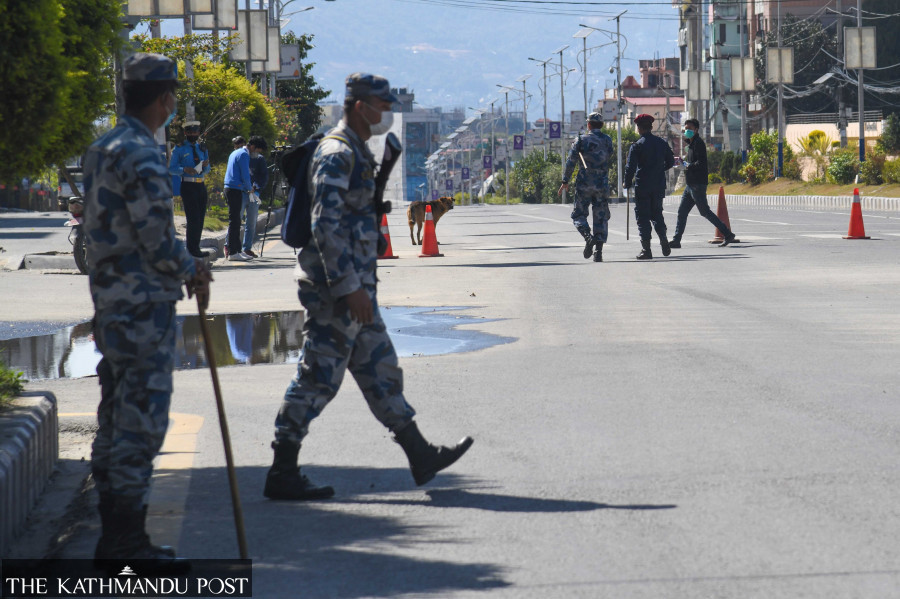Money
Confusion over ‘essential items’ hits online sellers' business
Authorities relaxed delivery rules under pressure from consumers and online traders but the guidelines weren't clear, insiders say.
Krishana Prasain
The government has lifted restrictions on online deliveries of essential items, but internet sellers say confusion prevails because of what "essential items" is supposed to mean.
From Sunday, after more than one and a half months since the lockdown began, merchants have been allowed to make home deliveries till 7 pm.
Authorities relaxed online delivery and take away service rules following pressure from consumers and ecommerce entrepreneurs, but they did not issue clear guidelines, keeping the public confounded.
Amun Thapa, founder of online store Sastodeal, said that the government in its latest prohibitory orders had not said anything about the kind of ecommerce platforms which are allowed to operate.
“It has also not mentioned the type of delivery vehicles or commuter permit to deliver goods. We were expecting a clear guideline for operation from the government. But it has created confusion,” Thapa said.
“Lack of coordination between the government and the police administration has created problems at every step. As a result of this confusion, it is taking four days to deliver goods from the time the order is received," he said.
According to Sastodeal, 40 percent of the orders it receives are from out of Kathmandu Valley, but as freight services have been suspended, the company is not able to fill out-of-valley orders.
The government issued the first prohibitory order that went into effect on April 29, and due to lack of clear guidelines regarding ecommerce, online stores were confused about providing service, and they had been making home deliveries till 9 am.
Kali Prasad Parajuli, chief district officer of Kathmandu, said delivery personnel could use both two-wheelers and four-wheelers to make home deliveries, but they must have a sign showing the name of the ecommerce firm.
“We have made a list of major ecommerce companies, and it will be sent to the police administration. Firms on that list can provide delivery service by both two-wheeler and four-wheeler,” Parajuli told the Post.
Parajuli said that the government would create a provision for the delivery of non-essential items in the next prohibitory order.
Online food delivery companies said they were seeing a surge in orders as valley residents have been missing restaurant food for nearly two months.
“Since the government unbanned take away service, we have been receiving more orders than we can handle,” said Manohar Adhikari, founder of Foodmandu that delivers restaurant food. "Orders have soared by more than threefold compared to normal times," he said.
"The government has allowed home deliveries till 7 pm, and since most orders come in the evening especially for dinner, it has been difficult to make deliveries within that time limit," he said.
According to Adhikari, more than half of the major restaurants that the company has partnered with have reopened, and other restaurants are in line to reopen.
Surakchya Adhikari, chief operating officer and co-founder of online supermarket Thulo.Com, said that the company had been making deliveries by four-wheeler, but it would be easier and faster if the government allowed them to use two-wheelers too.
"Since the government has not said anything about it, we don't know what to do," she added. "Orders for essential products have increased by threefold compared to normal times," she said, adding that people staying abroad were placing orders for goods for their families in the valley.
"Customers are asking for consumer electronic goods, but we are not allowed to deliver these items," Adhikari said. “Half of the orders we receive are for non-essential items,” she said.
"The government has talked about commuting rules for employees of banks and media houses, but it has not said anything about ecommerce personnel. Staff need to be present to operate and manage the logistics," Adhikari said.
Ecommerce entrepreneurs have been requesting the concerned ministries and District Administrative Offices that they be allowed to deliver all kinds of goods by following health safety protocols.
“We have lost hope because constant changes in government have pushed our issue into the background,” Thapa said. "The government can also learn by observing international practices."
According to Thapa, Sastodeal has closed the non-essential segment on its official website, but the company is still getting hundreds of enquiries for laptops, mobile phones, chargers, earphones and other electrical accessories necessary for office workers.
"People cannot cook if their stove is out of order, and it is an essential item because they need it to cook their food so they can eat," he said.
"It has been more than a month since the lockdown began; and in that time, people will need different items which are essential for them, like kitchenware, home appliances and electronic goods which are everyday necessities."
Thapa said that ecommerce entrepreneurs had been requesting the government for more than a year to allow them to deliver non-essential goods during the lockdown which are actually essential for customers.
Online retailers say half of the inquiries that they get are for non-essentials goods which have now become essentials, like consumer electronic goods, clothing and other items. As the government imposed the lockdown in the beginning of summer, customers planning to buy summer goods have not been able to do so.
Thapa said that orders for fast moving consumer goods had jumped by more than six-fold compared to normal times.
On June 7, the Supreme Court issued an interim order not to restrict ecommerce firms from making home delivery of essential goods during the lockdown, stating that they had become an important medium for providing essential services during the Covid-19 pandemic. Online stores had to wait for a week for the government to implement the court order.




 9.6°C Kathmandu
9.6°C Kathmandu















